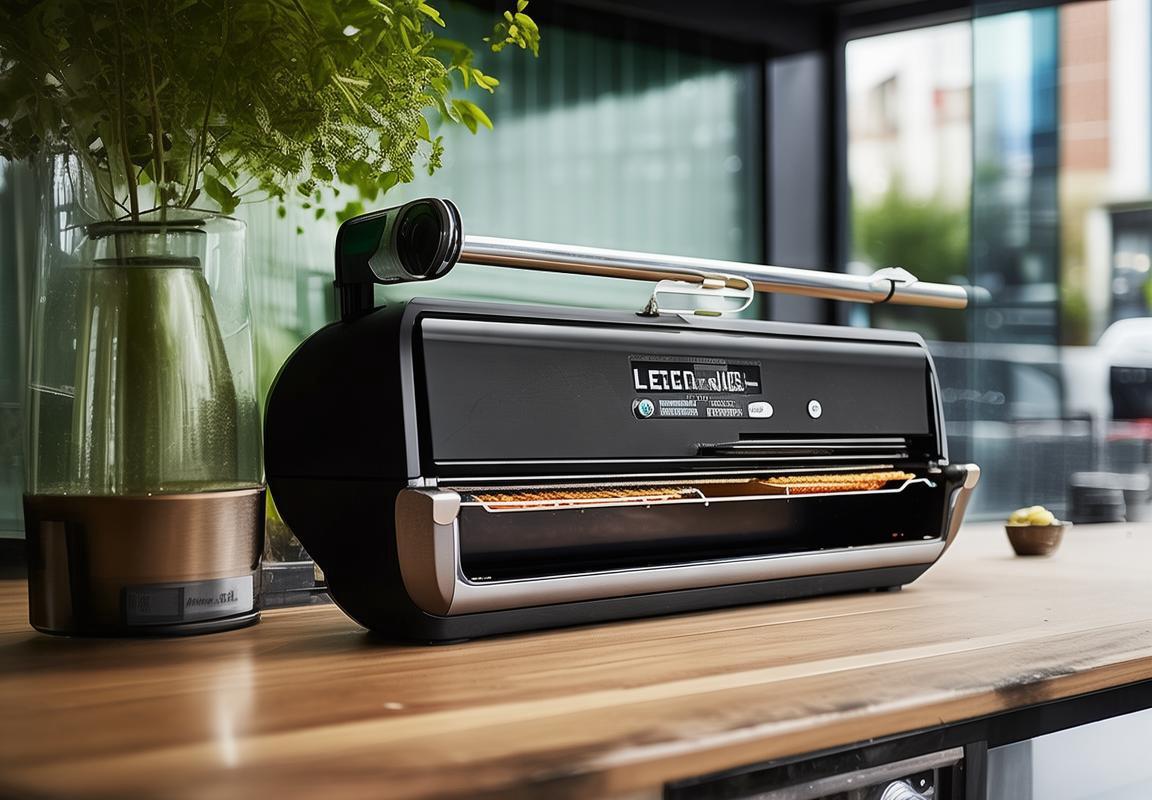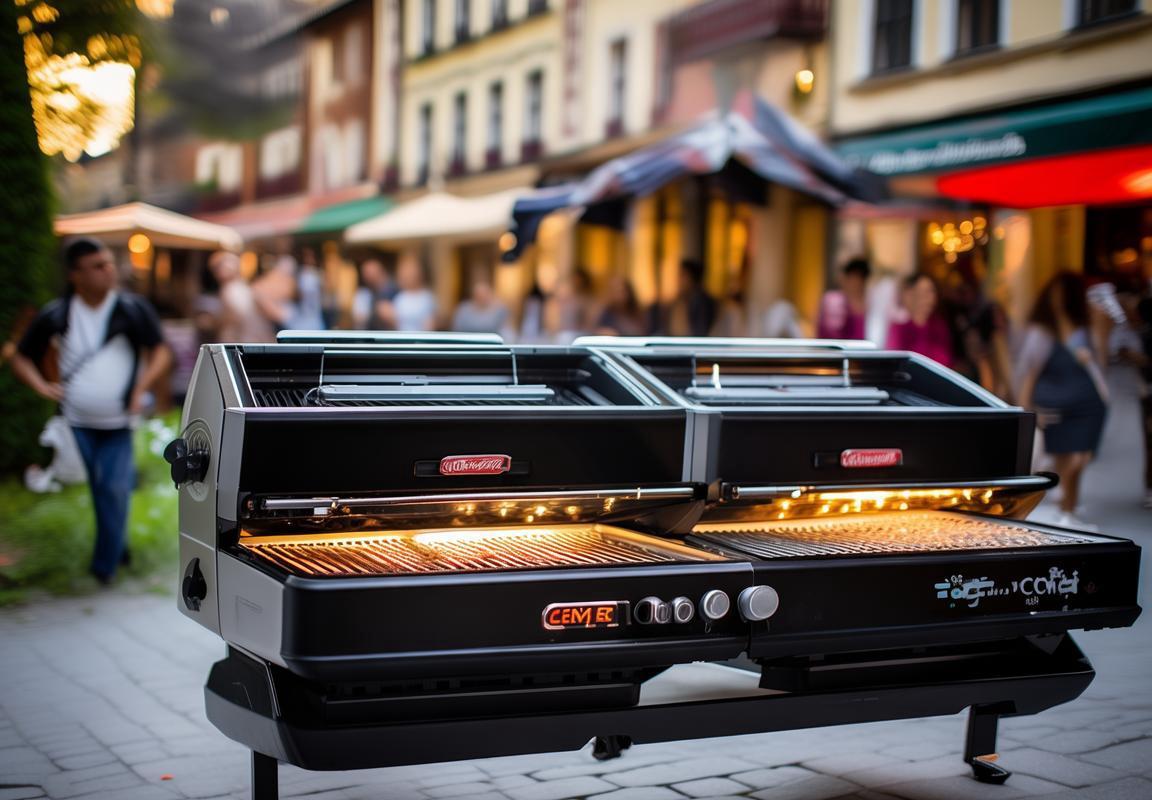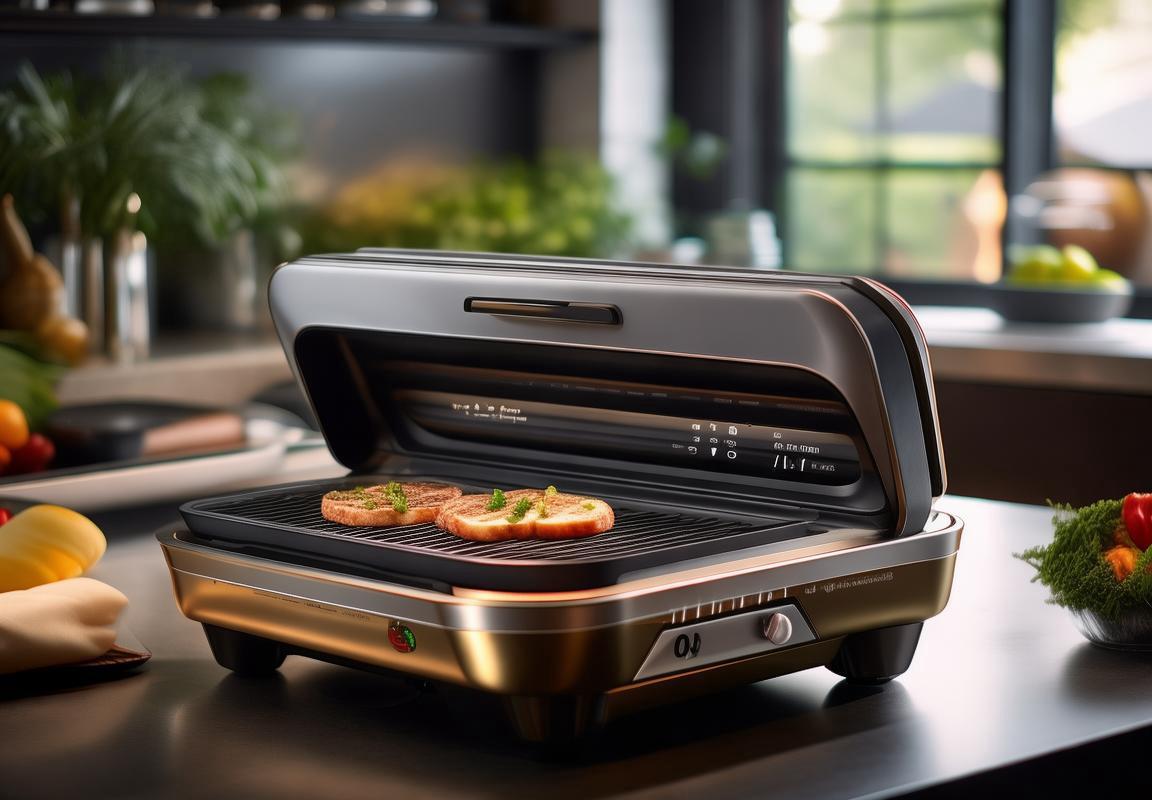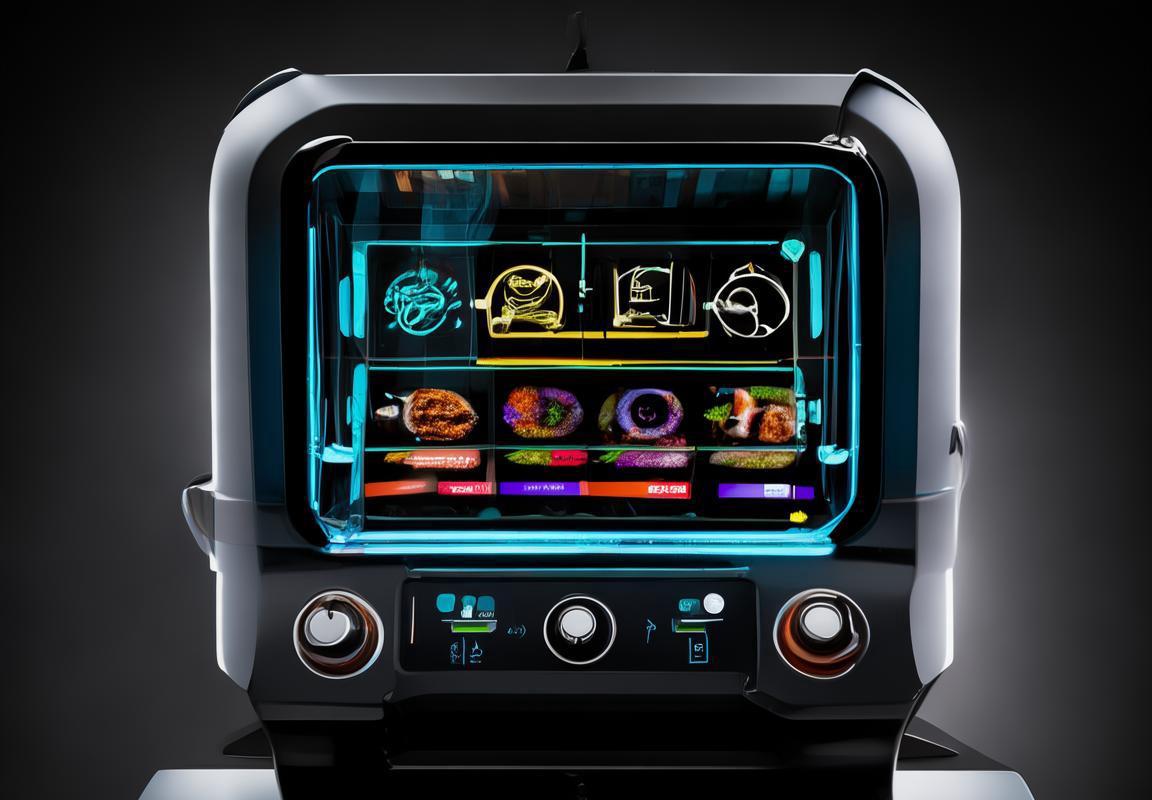As the world embraces more innovative cooking methods, electric grills have emerged as a staple in modern culinary culture. Once overshadowed by traditional charcoal and gas grills, these appliances have found their place in homes and patios across the globe. This shift in preference isn’t just a fad; it reflects a deeper transformation in how we approach cooking and entertaining. In this exploration, we delve into the evolution of electric grills, their growing popularity, and their significant role in shaping the future of cooking.
The Rise of Electric Grills in the Western Markets
The electric grill has seen a meteoric rise in popularity across the Western markets, becoming a staple in many kitchens from New York to London. This shift isn’t just a trend; it’s a testament to the evolving preferences of consumers and the convenience that electric grills offer.
Gone are the days when outdoor cooking was strictly reserved for summer barbecues. Electric grills have bridged the gap, making it possible to enjoy the taste of charred food without the need for a garden or a gas connection. The ease of use and clean-up, coupled with the flexibility to cook indoors or outdoors, has made them a must-have appliance for busy professionals and families alike.
One of the key factors contributing to the surge in electric grill sales is the increasing health consciousness among consumers. With a focus on wellness and a desire to avoid the fats often found in grilled food cooked on open flames, electric grills have stepped in as a healthier alternative. Their ability to cook with lower temperatures and controlled cooking surfaces ensures that food retains more nutrients and less fat.
Brands have responded by offering a wide range of electric grills that cater to different needs and preferences. From compact models perfect for small apartments to larger, more advanced models with features like multiple cooking surfaces and digital temperature controls, there’s an electric grill for every cooking enthusiast. The European market, with its emphasis on quality and innovation, has seen a particularly robust growth in premium electric grills, often equipped with high-tech features like Wi-Fi connectivity and integrated cooking apps.
In the United States, the electric grill market is diverse, with a strong focus on both indoor and outdoor cooking. American consumers value the versatility of electric grills, which can be easily moved from a kitchen counter to a balcony or patio. The rise of outdoor dining and the growing number of Americans living in urban areas without access to outdoor space has also fueled the demand for electric grills.
The integration of smart technology into electric grills has been a game-changer. Users can now monitor their grilling sessions through their smartphones, ensuring perfect cooking temperatures and times. This level of convenience and control has made electric grills more appealing than ever, as consumers seek out appliances that can simplify their lives without compromising on quality.
Despite the rise in popularity, there are challenges within the electric grill market. One major concern is the environmental impact of disposable grilling tools and covers, which can contribute to waste. Brands are addressing this by offering reusable and sustainable alternatives. Additionally, safety is a paramount concern, and manufacturers are constantly improving the design and materials used in their grills to ensure they are both flameless and secure.
Looking ahead, the electric grill market in the Western markets is poised for continued growth. As health trends persist and technology continues to advance, we can expect to see more innovative features and design improvements. The future may bring electric grills that can even be integrated into smart home ecosystems, providing an even more seamless cooking experience.
In summary, the rise of electric grills in the Western markets is a story of evolution and innovation. From the simple convenience they offer to the technological advancements that enhance cooking experiences, electric grills have become more than just an appliance; they are a symbol of the changing face of modern cooking.

Understanding the European and American Electric Grill Markets
The European electric grill market has seen a significant surge in popularity, driven by the region’s penchant for outdoor living and the growing interest in health-conscious cooking methods. Cities like London, Paris, and Berlin have embraced electric grills as a convenient and eco-friendly alternative to traditional charcoal or gas-powered grills. This shift is partly due to the city dwellers’ desire for quick and easy meals without compromising on quality.
In the USA, the electric grill market has a slightly different story. With a vast landscape of open spaces and a culture deeply rooted in backyard barbecues, electric grills have found their niche among those who are looking for a portable and cleaner option for their grilling needs. Urbanites and eco-conscious consumers have been at the forefront of this trend, seeking grills that are easier to use and less impactful on the environment.
European consumers are often drawn to electric grills for their sleek designs and advanced features. Brands like Philips, T-fal, and Morphy Richards offer a range of electric grills that cater to the European market’s demand for modern appliances. These grills often come with non-stick surfaces, precise temperature controls, and programmable cooking settings, making them a favorite among those who prefer a high-tech grilling experience.
On the other hand, the American market has a preference for electric grills that offer more power and versatility. Brands such as George Foreman and Hamilton Beach have gained a strong following with their heavy-duty models that can handle a variety of meats and cooking styles. The American consumer seems to value the ability to sear and grill to perfection, which electric grills with high heat output can provide.
Despite the differences in preference, both markets share a common interest in safety and ease of use. Electric grills eliminate the risks associated with open flames and the cleanup hassle of charcoal or gas grills. This convenience factor is a major selling point, especially in the fast-paced lifestyles of Westerners who appreciate not having to spend time on post-grilling maintenance.
The environmental impact of cooking methods is also a crucial consideration for many consumers in Europe and America. Electric grills produce zero emissions and are often seen as a more sustainable choice, especially as the global community becomes more aware of the importance of reducing carbon footprints. This green angle has certainly played a role in the rise of electric grills across both continents.
The integration of smart technology into electric grills has also been a game-changer in the Western markets. With features like Bluetooth connectivity, remote control, and smart grilling apps, electric grills have become a staple in the connected home ecosystem. Consumers are excited about the ability to monitor and control their grills from their smartphones, adding a level of convenience that aligns with the digital age.
In the European market, there’s also a notable trend towards health and wellness, which has spurred the development of electric grills with healthier cooking options. These include grills with adjustable temperature settings to prevent overcooking and grills that use less oil, thereby reducing the fat content in the final dish.
While the European and American electric grill markets have their unique characteristics, there are common threads that bind them together. Both regions have seen a shift towards more health-conscious cooking, an increased appreciation for technology, and a growing awareness of environmental concerns. As a result, the electric grill has emerged as a versatile and attractive option for consumers seeking a convenient, safe, and sustainable way to enjoy their favorite grilled dishes.

Key Trends Driving Electric Grill Adoption
The electric grill market has seen a remarkable surge in popularity, and several key trends are at the forefront of this adoption. From health consciousness to technological advancements, here’s a closer look at the forces shaping this growth.
Environmental Awareness and SustainabilityConsumers are increasingly concerned about the environmental impact of their lifestyle choices. Electric grills offer a greener alternative to traditional charcoal and gas models, emitting fewer pollutants and requiring less energy to operate. This eco-conscious approach appeals to a growing segment of environmentally aware consumers.
Health and WellnessAs the health and wellness movement gains momentum, individuals are seeking more nutritious and healthier cooking methods. Electric grills provide a way to cook meats and vegetables with minimal oil, reducing the risk of heart disease and cancer. The ability to control the heat and cooking time also allows for healthier grilling techniques like the use of marinades and herbs, enhancing flavor without the need for excessive fat.
Convenience and Ease of UseModern life is fast-paced, and convenience is king. Electric grills are often praised for their ease of use and maintenance. They can be quickly plugged in, preheated, and ready to cook within minutes. Cleanup is also a breeze, with some models featuring non-stick surfaces and easy-to-remove parts.
Technology IntegrationThe integration of technology into everyday appliances has become a norm, and electric grills are no exception. Features like digital temperature controls, LED displays, and programmable settings allow users to achieve precise cooking temperatures and times. This tech-savvy approach is particularly appealing to culinary enthusiasts who appreciate the ability to experiment with different recipes.
Urbanization and Lack of Outdoor SpaceThe rise of urban living has led to a decrease in outdoor space for grilling. Electric grills provide a compact and portable solution for city dwellers who may not have access to a traditional backyard or patio. Their small footprint makes them ideal for balconies, terraces, or even indoor use, catering to the needs of urbanites.
Cost-EffectivenessElectric grills are often more cost-effective in the long run. They typically have lower upfront costs compared to gas grills and are less expensive to run due to their energy efficiency. Additionally, there’s no need to purchase fuel or charcoal, which further reduces overall expenses.
Health Concerns with Traditional Grilling MethodsTraditional grilling methods, such as those using charcoal or gas, can produce harmful compounds like polycyclic aromatic hydrocarbons (PAHs) and heterocyclic amines (HCAs), which are linked to health risks. Electric grills, on the other hand, emit fewer of these harmful substances, making them a healthier choice for those concerned about potential health impacts.
Globalization and Cross-Cultural InfluencesAs people travel more and experience different cultures, they bring back a desire to replicate their favorite flavors and cooking techniques at home. Electric grills offer a versatile tool for cooking a wide range of dishes, from traditional barbecue to international cuisine, making it easier for consumers to embrace diverse culinary styles.
E-commerce and Online ShoppingThe rise of e-commerce has made it easier than ever for consumers to purchase electric grills. Online shopping provides access to a wide variety of models, competitive pricing, and detailed product information. The convenience of home delivery has also made electric grills more accessible to a broader audience.
Sustainability of Energy SourcesWith the increasing focus on renewable energy sources, the use of electric grills aligns with the broader goal of reducing reliance on fossil fuels. As renewable energy becomes more prevalent, the environmental benefits of electric grills will likely become even more pronounced.
In conclusion, the adoption of electric grills is driven by a combination of environmental concerns, health consciousness, convenience, technological innovation, and cultural influences. These factors have created a perfect storm that has propelled the electric grill market to new heights, making them a popular choice for both casual and seasoned grillers alike.

Popular Electric Grill Brands in Europe and the USA
In the competitive landscape of electric grills, certain brands have stood out, gaining a strong foothold in both European and American markets. Here’s a closer look at some of the most popular electric grill brands across these regions:
-
George ForemanRenowned for its innovative design and health-focused grilling solutions, George Foreman grills have become a staple in many homes. Known for their flat-top design that helps drain excess fat, these grills are favored for their ability to cook evenly and offer a non-stick surface. In Europe and the USA, George Foreman continues to be a go-to brand for those looking for a reliable and efficient electric grill.
-
Char-BroilChar-Broil has a long-standing reputation for producing high-quality outdoor cooking equipment. Their electric grills are no exception, offering a range of options from entry-level models to more advanced units with additional features. With a strong presence in both Europe and the USA, Char-Broil’s electric grills are known for their durability and affordability.
-
WeberWhile Weber is often associated with charcoal and gas grills, the brand has also made a name for itself in the electric grill market. Known for their robust construction and attention to detail, Weber’s electric grills are designed to deliver a grilling experience that closely mimics traditional charcoal grilling. This appeal has helped Weber maintain a loyal customer base in both Europe and the USA.
-
BrevilleBreville, a brand known for its premium kitchen appliances, has extended its reach into the electric grill category. Their electric grills are characterized by sleek designs and advanced technology, including features like adjustable heat settings and non-stick surfaces. Breville’s products are often found in upscale European and American kitchens, appealing to those who value both form and function.
-
CuisinartCuisinart has a diverse range of electric grills that cater to various cooking styles and preferences. From compact models suitable for small spaces to larger grills designed for entertaining, Cuisinart offers a wide selection that appeals to both European and American consumers. The brand is recognized for its quality and affordability, making it a popular choice for those looking for a reliable electric grill.
-
Hamilton BeachHamilton Beach is a well-known name in small kitchen appliances, and their electric grills are no different. Known for their simplicity and ease of use, Hamilton Beach grills are often chosen by those who prefer a straightforward grilling experience. These grills are a staple in many European and American homes, particularly for those who are new to grilling or looking for a no-frills option.
-
Black & DeckerBlack & Decker has a reputation for producing durable and user-friendly appliances, and their electric grills are no exception. These grills are often compact and portable, making them a great choice for those with limited space or who enjoy grilling on the go. In both Europe and the USA, Black & Decker grills are valued for their reliability and affordability.
-
DuxtopDuxtop offers a range of electric grills that are highly regarded for their versatility and performance. Their grills are often equipped with multiple heat zones and adjustable temperature controls, allowing for precise cooking. Duxtop’s products are well-received in both European and American markets, particularly among those who appreciate the ability to grill a variety of foods.
-
Chef’s ChoiceChef’s Choice is a brand that has made a name for itself with its high-quality kitchen tools and appliances. Their electric grills are designed with the chef in mind, offering features like adjustable cooking temperatures and non-stick surfaces. Chef’s Choice grills are often found in European and American professional kitchens and among serious home cooks who demand precision and performance.
-
MasterbuiltMasterbuilt is known for its expertise in smokers and outdoor cooking equipment, but the brand has also ventured into the electric grill market. Their grills are designed to provide a similar cooking experience to traditional charcoal grills, with the convenience of electric heat. Masterbuilt’s electric grills are popular in both Europe and the USA, especially among those who enjoy the smoky flavors of grilled foods.
These brands have carved out a niche in the electric grill market by offering a variety of options that cater to different cooking preferences and budgets. Whether it’s for a quick meal or a weekend barbecue, these brands have become synonymous with quality and reliability in the European and American markets.

Consumer Preferences and the Role of Technology
Consumers today are increasingly seeking convenience, efficiency, and innovation in their kitchen appliances, and electric grills have risen to meet these demands. The role of technology in shaping consumer preferences for electric grills is undeniable, influencing everything from design to functionality.
Gone are the days when grilling was limited to outdoor spaces with access to open flames. Modern electric grills are sleek, compact, and can be placed almost anywhere, making them a popular choice for urban dwellers and those with limited outdoor space. The ability to grill indoors without the smoke and smell has become a significant draw for tech-savvy consumers.
Smart features have become a cornerstone in the electric grill market. With the integration of Bluetooth connectivity, users can now control their grills remotely via smartphone apps. This technology allows for precise temperature regulation, timer settings, and even recipe suggestions based on the grill’s capabilities. Such advancements have made the grilling experience more intuitive and tailored to individual preferences.
Safety is another key factor in consumer preferences. Electric grills eliminate the risk of open flames and the potential for gas leaks, making them a safer option for families with children or those living in high-rise apartments. The absence of flame also means a lower risk of accidental burns, which is a significant concern for many consumers.
The trend towards healthier eating has also played a role in the popularity of electric grills. With the ability to control the temperature more effectively, consumers can achieve a perfect sear without the need for excessive oil or butter. This not only results in healthier meals but also aligns with the growing preference for low-fat, low-calorie cooking methods.
The convenience of cleaning and maintenance is a crucial consideration for many consumers. Electric grills are often easier to clean than traditional charcoal or gas grills due to their enclosed design and lack of complex components. This ease of maintenance, coupled with the reduced need for periodic flame cleaner purchases, makes electric grills a more attractive option for busy households.
Brands are responding to these consumer preferences by incorporating advanced technology into their designs. For example, features like adjustable cooking surfaces that can change from flat to grill-like textures offer greater versatility. The ability to switch between direct and indirect heat also caters to a wider range of recipes and cooking techniques.
Another significant trend is the use of non-stick coatings and ceramic surfaces on electric grill plates. These materials reduce the need for oil and make it easier to clean food residues, which appeals to consumers looking for a hassle-free grilling experience.
Moreover, the integration of safety features such as auto shut-off mechanisms in case of overheating or prolonged use has become a standard in many electric grill models. This focus on safety reassures consumers that they are making a responsible purchase for their homes.
The rise of health-conscious consumers has also influenced the design of electric grills. Many models now come with adjustable temperature settings, allowing for different types of cooking such as low and slow smoking, which is popular among those following the slow-cooker lifestyle.
The technology behind electric grills has also led to the development of grill covers that can be preheated, ensuring that the grill is ready to go as soon as it’s needed. This feature is particularly appreciated by consumers who want to be able to start grilling immediately without the wait for the grill to heat up.
In conclusion, consumer preferences in the electric grill market are driven by a combination of convenience, health, safety, and innovation. The role of technology in enabling these preferences cannot be overstated, as it continues to shape the landscape of electric grills and what consumers look for in a modern cooking appliance.

The Impact of Smart Features on Electric Grill Sales
In recent years, the integration of smart features into electric grills has revolutionized the way consumers approach outdoor cooking. These innovations have not only enhanced the user experience but have also significantly impacted sales in the electric grill market. Let’s delve into how these smart features are shaping the landscape.
The rise of connectivity has made it possible for electric grills to offer real-time monitoring and control through smartphones or tablets. Users can now adjust temperatures, monitor cooking times, and receive alerts directly from their devices, which adds a layer of convenience that was previously unimaginable. This level of connectivity has become a major draw for tech-savvy consumers, leading to increased sales as they embrace the fusion of cooking and technology.
Safety features, such as automatic shut-off and temperature control, have always been crucial for electric grills. However, with the introduction of smart technology, these safety measures have been taken to new heights. Smart grills can detect when temperatures exceed safe limits and shut off automatically, preventing accidents and burns. This added security has reassured many consumers, especially those with families, leading to a boost in sales among safety-conscious shoppers.
The ability to preheat and sear food directly on the grill is a game-changer for many home chefs. Smart electric grills often come with preheat and sear settings that allow for a perfect start to the cooking process. This feature is particularly appealing to those who appreciate the flavor and texture of seared meats but may not have the time or confidence to do so manually. The convenience of these smart features is translating into higher sales as consumers seek to elevate their home cooking experience.
Customization is another area where smart features have made a significant impact. Many modern electric grills offer programmable settings that allow users to tailor the cooking process to their specific preferences. From selecting the exact temperature for different types of meat to setting timers for various cooking stages, these features provide a level of control that traditional grills simply can’t match. The allure of personalization is driving sales as consumers look for appliances that can cater to their unique tastes.
Energy efficiency is a growing concern for many consumers, and smart electric grills have responded by incorporating energy-saving technologies. These grills often have features like eco modes that reduce power consumption without compromising performance. As environmental consciousness continues to rise, the energy-efficient aspect of smart grills is becoming a key selling point, influencing sales positively.
The integration of smart features has also opened up new opportunities for grill manufacturers to innovate. From touchscreens that offer interactive cooking guides to Bluetooth connectivity that allows for updates and new features, the possibilities are vast. These innovations are not only exciting for consumers but also for the industry, as they drive sales by offering a constant stream of new and improved products.
The role of social media and online reviews cannot be overstated when discussing the impact of smart features on electric grill sales. As consumers seek out the latest technology and the best user experiences, they turn to platforms like Instagram, YouTube, and Amazon for inspiration and information. The popularity of smart features has led to a surge in user-generated content, which in turn has fueled sales by showcasing the benefits of these advanced grills.
Lastly, the rise of smart features has also led to a shift in the way consumers perceive electric grills. Once seen as a simpler alternative to traditional charcoal or gas grills, electric grills with smart features are now seen as a premium product that offers the best of both worlds: ease of use and advanced technology. This perception change has significantly impacted sales, as consumers are willing to pay a premium for the convenience and innovation that smart features bring to the table.
In conclusion, the impact of smart features on electric grill sales is multifaceted, encompassing convenience, safety, customization, energy efficiency, innovation, and consumer perception. As these features continue to evolve, their influence on the market is expected to grow, shaping the future of electric grill sales and consumer expectations.

Challenges and Opportunities in the Electric Grill Industry
The electric grill industry has seen significant growth, but like any burgeoning market, it’s not without its set of challenges and opportunities. Here’s a closer look at the intricacies shaping this dynamic sector.
Consumers are increasingly seeking convenience, and electric grills have stepped up to meet this demand with features that streamline the grilling process. However, this convenience often comes at a price, and budget-conscious shoppers might be hesitant to invest in high-tech grills.
Safety remains a top concern for many grill enthusiasts. While electric grills are generally safer than their gas counterparts, issues like overheating or electrical malfunctions can pose risks. Brands that prioritize safety features are likely to see a loyal customer base.
The rise of health consciousness has led to a surge in interest in electric grills that offer a healthier alternative to traditional grilling methods. Without the smoke and flame, these grills can reduce the formation of harmful compounds like heterocyclic amines (HCAs) and polycyclic aromatic hydrocarbons (PAHs).
The integration of smart technology has become a game-changer for electric grill sales. Features like Bluetooth connectivity, temperature control, and recipe integration are not just nice-to-have; they’re becoming standard expectations. Consumers are willing to pay a premium for the convenience and precision these features offer.
Eco-conscious consumers are driving the market towards more sustainable options. Electric grills that are energy-efficient and made from recyclable materials are gaining traction. Brands that can offer green credentials are tapping into a growing segment of environmentally aware buyers.
The competition is fierce, with a wide array of brands vying for market share. From established names like George Foreman to upstarts with innovative designs, the market is crowded. This competition drives innovation but also puts pressure on pricing and profitability.
Distribution channels play a crucial role in the electric grill industry. Online sales have surged, offering brands a direct-to-consumer model that can cut costs and provide more personalized customer experiences. However, traditional brick-and-mortar retailers still hold significant sway, especially in the initial stages of consumer decision-making.
Seasonality can be a challenge for the electric grill industry. While grilling is a year-round activity, peak sales often occur during warmer months. Brands must plan their marketing and inventory management to account for this seasonal fluctuation.
The rise of social media and influencer marketing has opened new avenues for electric grill brands to reach consumers. Positive reviews and endorsements from popular chefs and influencers can significantly boost sales. However, the industry must navigate the complexities of influencer credibility and the potential for fake reviews.
Regulatory compliance is a non-negotiable aspect of the electric grill industry. Brands must adhere to strict safety and environmental regulations, which can vary by region. Ensuring compliance while maintaining competitive pricing is a delicate balance.
Customer service is often overlooked but can be a major differentiator. Brands that offer exceptional customer support, including clear instructions, troubleshooting guides, and responsive customer service, can build long-term customer loyalty.
Lastly, the opportunity for innovation in the electric grill industry is vast. From the development of new materials that improve durability to the creation of smart features that enhance the grilling experience, there’s room for brands to push the boundaries of what’s possible. As consumer tastes evolve, so too must the offerings of the electric grill market.

Predictions for Future Growth and Market Expansion
In the evolving landscape of the electric grill industry, several factors are poised to shape its future growth and market expansion. As consumer preferences shift and technological advancements continue to drive innovation, the following trends and opportunities emerge.
The surge in health consciousness is fueling a demand for electric grills that offer healthier cooking options. With a growing number of consumers seeking to reduce their intake of unhealthy fats, electric grills with features like adjustable heat settings and non-stick surfaces are becoming increasingly popular.
Smart technology integration is transforming the electric grill experience. Grills equipped with Bluetooth connectivity, temperature control apps, and built-in timers are not just convenient but also provide a level of precision that traditional grilling methods cannot match. This tech-savvy approach is attracting tech enthusiasts and convenience-seekers alike.
The rise of outdoor living spaces has opened new markets for electric grills. As urbanization continues and people look for ways to bring the outdoors into their homes, electric grills are becoming a staple in balconies, patios, and small gardens. This trend is expected to expand as more homeowners invest in creating outdoor entertainment areas.
The environmental movement is also playing a role in the growth of the electric grill market. With concerns over the environmental impact of traditional charcoal and gas grills, electric models are seen as a greener alternative. As sustainability becomes a key purchasing criterion, the demand for eco-friendly electric grills is likely to rise.
Globalization has made it easier for electric grill brands to expand their reach. The internet has democratized access to information and products, allowing companies to market their grills internationally. This has led to a more competitive market, but it has also introduced new consumers to the benefits of electric grilling.
The customization of electric grills is becoming a trend, with consumers seeking models that cater to their specific needs. From various cooking surfaces to adjustable heat zones, the ability to tailor a grill to individual preferences is attracting a diverse range of customers. This trend is likely to continue as manufacturers innovate and offer more personalized options.
As the electric grill industry grows, there’s an increasing focus on safety. With the risk of gas leaks and open flames, electric grills offer a safer alternative, especially in urban settings where fire hazards are a concern. The industry must continue to prioritize safety features to maintain consumer trust and encourage wider adoption.
The integration of electric grills into smart home ecosystems is another opportunity for growth. As more homes become equipped with smart devices, electric grills that can be controlled via voice assistants or smartphone apps are becoming more appealing. This convergence of technology is expected to drive sales as homeowners seek to streamline their home automation.
The expansion of the electric grill market is not without its challenges. Competition is fierce, with established brands and new entrants alike vying for market share. Brands must differentiate themselves through quality, innovation, and marketing strategies that resonate with consumers.
The rise of e-commerce has both opportunities and challenges for the electric grill industry. While online sales offer a vast market, they also require robust customer service and returns policies to ensure satisfaction. Additionally, the ease of online shopping means that consumers can easily compare prices and features, putting pressure on retailers to offer competitive pricing and value.
In conclusion, the electric grill industry is on the cusp of significant growth and market expansion. With a focus on health, technology, environmental responsibility, and customization, the industry is well-positioned to meet the evolving needs of consumers. While challenges such as competition and e-commerce logistics remain, the opportunities for innovation and market penetration are substantial. As the industry continues to evolve, those who adapt and embrace these trends are likely to see their share of the market flourish.

Conclusion: The Electric Grill’s Place in Modern Cooking Culture
In the evolving landscape of modern cooking culture, electric grills have carved out a significant niche for themselves. Their convenience, versatility, and ability to deliver that beloved grill flavor without the smoke and fire of traditional charcoal or gas grills have made them a staple in many kitchens around the world. Here’s how electric grills have become an integral part of our culinary routines.
Grills have transitioned from being a seasonal tool to an all-year-round appliance, offering flexibility that caters to the changing demands of consumers. The ease of use, clean-up, and the ability to grill indoors or outdoors has made them a year-round favorite. This shift has not only expanded the market but also redefined the way we think about grilling.
The integration of smart technology into electric grills has been a game-changer. With features like temperature control, Bluetooth connectivity, and pre-programmed settings, electric grills have become smarter and more user-friendly. These innovations have not only made grilling more accessible but have also brought a new level of precision and control to the cooking process.
As the demand for healthier eating habits continues to grow, electric grills have stepped in as a healthier alternative to traditional grilling methods. They eliminate the need for additional fats, like oil, and the risk of flare-ups that can lead to unhealthy compounds. This health-conscious appeal has expanded the market to include a broader demographic, including those with dietary restrictions.
Despite the advancements and popularity, the electric grill industry faces its fair share of challenges. One of the most significant is the price point, which can be higher than traditional grills. However, as technology advances and production scales up, we’re likely to see more affordable options hitting the market.
Another challenge is the perception of flavor. While many have come to appreciate the taste of food cooked on an electric grill, there remains a segment of the market that prefers the smokiness and char of charcoal or gas grilled food. Brands will need to continue to innovate and market their products effectively to bridge this gap.
Opportunities in the electric grill industry are vast. The rise of outdoor living spaces, particularly in urban areas, has created a demand for compact, portable electric grills that can be easily stored and used in small patios or balconies. Additionally, the integration of electric grills into commercial kitchens is a burgeoning trend, offering a professional-grade cooking experience in a more energy-efficient format.
Globalization has also opened up new markets for electric grills. As people travel more and become more exposed to different cuisines, they are bringing back a taste for international flavors that can be replicated at home with the help of electric grills. This cross-cultural exchange is fueling innovation and pushing the boundaries of what electric grills can do.
Looking ahead, the electric grill’s place in modern cooking culture is set to become even more prominent. The industry is expected to see continued growth, driven by an aging population that values convenience and health, and by younger consumers who are looking for ways to incorporate new technologies into their cooking routines.
As the demand for convenience and health continues to rise, electric grills are poised to become even more central to our cooking habits. The integration of smart features will likely become even more sophisticated, with grills that can predict cooking times based on weather conditions or food type, and with the potential for personalized recipes and cooking profiles.
In conclusion, the electric grill’s place in modern cooking culture is solidified by its convenience, health benefits, and the innovation that keeps it at the forefront of kitchen appliances. Whether it’s for a quick weeknight dinner or a weekend barbecue, the electric grill has found its spot as a versatile and indispensable tool in the modern kitchen.